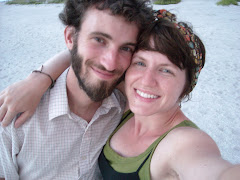A few nights ago we had dinner with a group of students visiting ECHO from the University of Florida. The course they were taking is a six-week intensive course on tropical agriculture, and many of the students were from Central and South America.
One student was a Bahamian farmer who was questioning us about the Mennonites, because the next farm over from his on Andros Island is the Mennonite Mission Farm (that links to the most information we were able to find). He feels that the people running this organization are "greedy" and opportunistic, and wondered about our connection to them.
This was actually our first encounter with negative publicity about the Mennonites, so we were a little taken aback. We attempted to communicate the fact that we didn't support the business practices he described, and that we would be in favor of his efforts to start a competitor to the equipment-rental services apparently offered by this Farm.
This farmer then went on to proffer an even larger question. He asked why we, as white people, are going to Haiti to "help black people." To paraphrase: "Why aren't wealthy African-Americans doing more to help black people around the world? You should let us clean our own house."
Sure, it's a valid question. What right do we have, as young, relatively inexperienced people, to trek to another country and share development tips? My response takes three parts:
1. "Helping." In our capacity as MCC service workers, we will do far more learning than teaching, more listening than talking, and more observing than showing. Our role is to support, build capacity, and share ideas. We are going to Haiti to expand our own knowledge as much as to help anyone.
2. "Black." The condition of the developing world is not a black problem. As a white North American, I have benefited from the ongoing legacy of centuries of slavery, colonialism, and oppression. And there are of course plenty of black Americans serving as community development workers all around the world, but these questions and issues affect all of us.
3. "People." Culturally, we would of course be more "effective" in our own country, city, and neighborhood. However, part of our goal is to go and learn--and then return to our own culture and act as cultural bridge-builders as we are able to share our experiences in Haiti.
I know this is a super-abbreviated gloss of the issues at hand, but I would welcome any thoughts and opinions.
Sharon
PS--Tomorrow we plan to post a little more about the fascinating things we've been learning at ECHO, but I wanted to get this off my chest first.
Monday, July 28, 2008
Subscribe to:
Post Comments (Atom)


No comments:
Post a Comment